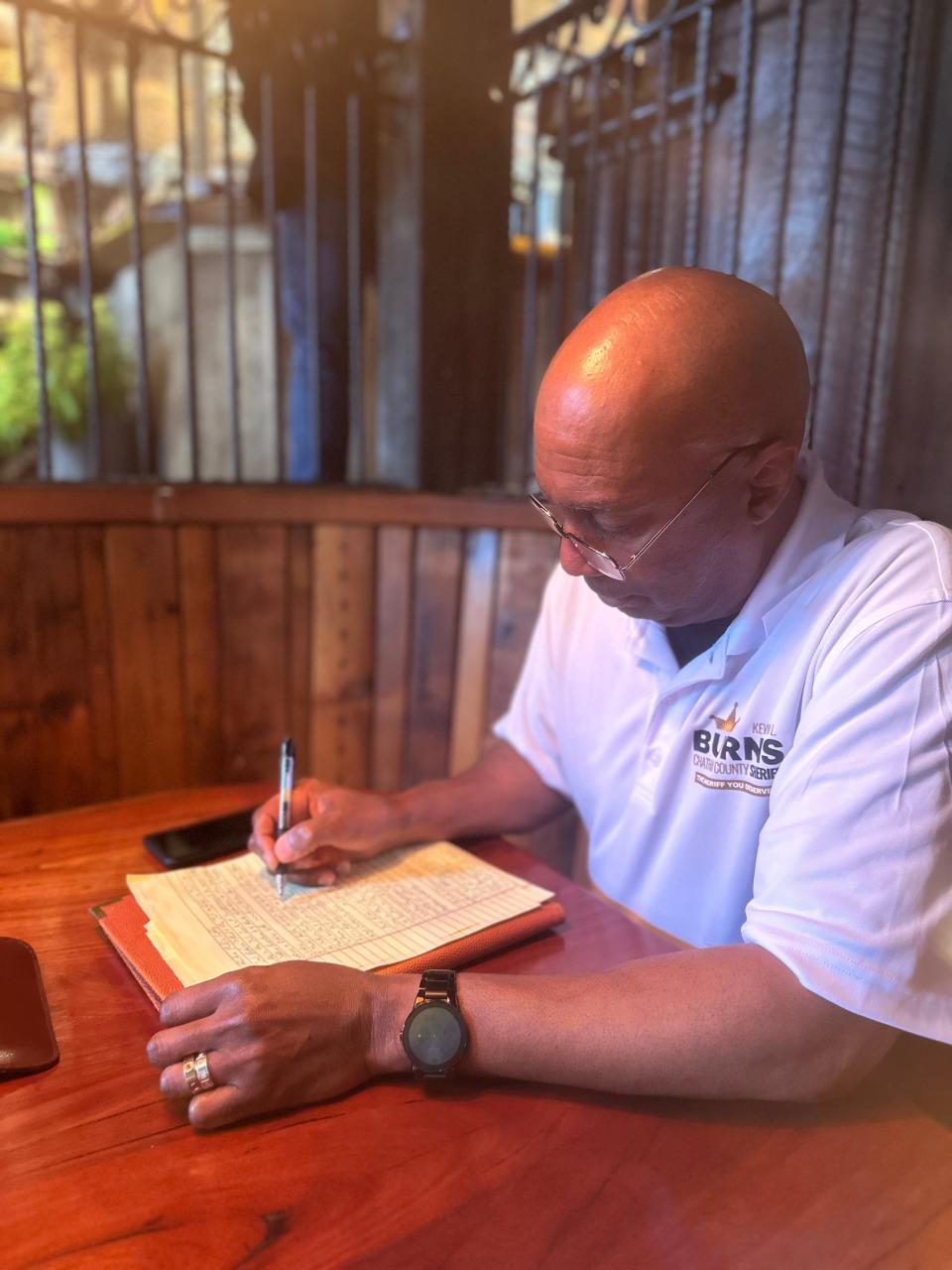Chatham County Sheriff candidates speak at League of Women's Voters Forum
Chatham County Sheriff candidates Richard Coleman and Kevin Burns squared off during a candidate forum on April 29, hosted by the League of Women’s Voters of Coastal Georgia.
The general primary election will take place on May 21. The winner of that race will face Sheriff John Wilcher, who replaced six-term sheriff Al St. Lawrence, who died in office in 2015. Seven months after winning a special election for the seat, Wilcher was elected to a full term and re-elected in 2020.
More: Chatham DA faces Democratic challenger at forum hosted by League of Women's Voters
More: Longtime police officer Richard Coleman announced 2024 run for Chatham County Sheriff
More: Former Chatham County Sheriff's Deputy Kevin Burns explains why he wants the top job


What did the Sheriff candidates say at the event?
During the event, Burns emphasized his experience working at the Chatham County Sheriff’s Office. He also spoke about implementing jail reform, changing the narrative surrounding inmates' mental health and aggressively recruiting new corrections officers.
“I think the most important thing that I see at that jail that needs to be changed is the way how the inmates are being treated,” said Burns. “Their Eighth Amendment rights are being violated. There are a lot of things that need to be reformed in that jail, [such as] the policies and procedures.”
Coleman, meanwhile, emphasized his experience overseeing internal affairs. He argued for the need for increased transparency, improving jail conditions, and, like Burns, taking a closer look at the mental health of inmates.
"There's a change we need in that sheriff's office, and the sheriff requires a different direction," said Coleman. "I'm running to be that direction."
Understaffing at the jail
To Burns, the biggest issue facing the jail is the lack of employees. When Wilcher took office in 2016, there was a deficit of 35 officers, said Burns. Today, Burns said, there is a deficit of 200-plus officers.
But according to an email from CCSO paralegal Jackie Roberts, that figure is a bit lower. The CCSO has 120 total vacancies for Deputy Corrections Officers, Deputy Sheriff Advances and Deputy Sheriff Corporals.
“That makes the community less safe," said Burns. "That makes the jail less safe. Something needs to be done.”
Coleman agreed, saying "staffing is very important. I understand that staffing is very low.”
Drug smuggling at the jail
The lack of hiring retention, Burns said, explains why drugs and fentanyl are being smuggled into the jail. “Not everyone can do the job of law enforcement,” said Burns.
According to previous reporting by the Savannah Morning News, there have been at least five arrests of former CCSO corrections officers or contract workers hired at the CCSO within the past two years. Since Wilcher took office in 2016, seven total former CCSO corrections officers or contract workers hired at the CCSO have been charged with drug smuggling, according to an email from Roberts.
Burns said he would conduct an extensive background check for the people CCSO is considering hiring, and searching the corrections officers and inmates’ cells for contraband.
“I will definitely crack down on the security. I will definitely make sure that the jail is a safe environment,” said Burns. “I will definitely, definitely do my best to make sure that jail is under control, where we don't have fentanyl flowing through the jail.”
To prevent drug smuggling into the jail, Coleman said he would station a canine dog at the entrance and exit of the jail.
“We won't stop drugs from coming into the Detention Center. I can't guarantee that 100%. That’s a perfect world we don’t live in. But I can fight like hell for the 99.9 percent.”
More: Supervisor recommended firing Chatham corrections officer recently charged for drug smuggling
More: Chatham County Detention Center knew of correctional officer's history of drug smuggling
Mental health issues at the jail
At the event, the two CCSO sheriff candidates also addressed mental health issues of inmates in the jail.
Coleman said 30 to 35 percent of the jail population are on medications to address mental health needs. He said the jail has to implement diversion programs. “These people need help, not incarceration,” said Coleman.
As of March 31, 311 inmates, or about 28% of the jail population, are receiving medications to address their mental health needs, according to an email from Roberts.
Burns agreed, adding that the problem is that the jail “only has one psychiatrist."
In an email, Roberts wrote that "CorrectHealth employs one full-time psychiatrist and one part-time psychiatrist, one full-time Psychiatric NP/one Psychiatric NP (PRN), six mental health counselors, one Mental Health Case Manager, one Mental Health Administrator, and one Gateway Liaison to ensure the availability of psychiatric services."
"This staffing strategy meets the mental health needs of inmates by providing both consistent and flexible care options," said Roberts.
Roberts added that the 14-bed restoration program "enhances the recovery process." Roberts said that the 17 programs supported by the inmate welfare fund, including yoga classes, gardening classes and dog training, "form a foundational support structure enhancing the medical treatment for mental health."
The CCDC also employs six therapists, three licensed clinical social workers, four alcohol and drug counselors, one peer support specialist, and two anger management therapists, said Roberts.
According to CCDC records, eight of the 20 inmates who have died at the jail since 2016 committed suicide.
Burns added that Wilcher’s campaign is being funded by CorrectHealth. “That, to me, is a conflict,” said Burns. “That doesn’t help the situation.”
Chatham County Sheriff John Wilcher has raised more than $230,000 for his re-election campaign since 2016, including a portion from contractors operating in the Chatham County Detention Center (CCDC), such as CorrectHealth, according to previous reporting by SMN. Of the $230,000 he has raised, $7,500 has come from CorrectHealth's owner, Carlo Musso, and his wife, Teresa Musso.
More: With few beds, fewer psychologists, Georgia inmates wait months for mental health evaluations
More: Two internal investigations reveal Creely's death in Chatham County jail 'preventable'
More: Contractors with Chatham County jail contribute to Sheriff John Wilcher's election campaign
To address the mental health issues, Burns said the answer is to hire more officers, implementing more suicide prevention tactics and “getting more healthcare providers.”
Coleman, meanwhile, emphasized increasing mental health training for officers on the streets. He said he would meet with the governing bodies to create a diversionary program. “Officers on the street should be able to recognize mental health before they are even brought into the jail.”
In-person visitation and phone fees
At the event, the moderator asked about in-person visitation for attorneys and inmates’ families at the jail, which she said the current sheriff does not currently allow - which Roberts corroborated in an email.
As to why the jail does not currently allow in-person visitation, Roberts cited "several critical considerations," including the spread of contagious illnesses, such as COVID-19. Roberts also said in-person visitation would require "substantial staff resources," which would increase "operational costs."
"Accommodating secure in-person visits is costly and often impractical," said Roberts, who added that they could lead to potential escape attempts.
Inmates receive one free video visitation per week. Profits earned from visitation are directly allocated to the Inmate Welfare Fund, which supports various programs for the inmates.
A motion filed in March of 2023 by the Chatham County Public Defender's Office revealed that the Chatham County Detention Center (CCDC) was denying inmates “meaningful access” and “the right to communicate” with their defense attorneys, according to previous reporting by SMN. As such, the public defender’s office requested CCDC allow for reasonable access, including in-person, face-to-face visits at any time of the day.
More: Public Defender: Jail denying accused, including Leilani Simon, access to defense lawyers
Asked about his stance on in-person visitation, Burns said he would “revisit it at a later time.” Burns also said he wouldn’t charge inmates’ families “much more” than they are currently being charged to call inmates.
“The way I look at it, you know, sometimes when we have this when we used to have visitation in person, a lot of times the family members there would do something ill-mannered and stuff like that. So, it doesn't make it really conducive.”
If elected, Coleman, on the other hand, said he would allow in-person visitation. “That is a concern that's come from many constituents out in the community, not being able to see their loved ones,” said Coleman, who also added that he is “totally against” charging families to call inmates.
Drew Favakeh is the public safety and courts reporter for Savannah Morning News. You can reach him at AFavakeh@Gannett.com.
This article originally appeared on Savannah Morning News: Chatham County Sheriff candidates speak at League of Women's Voters Forum

